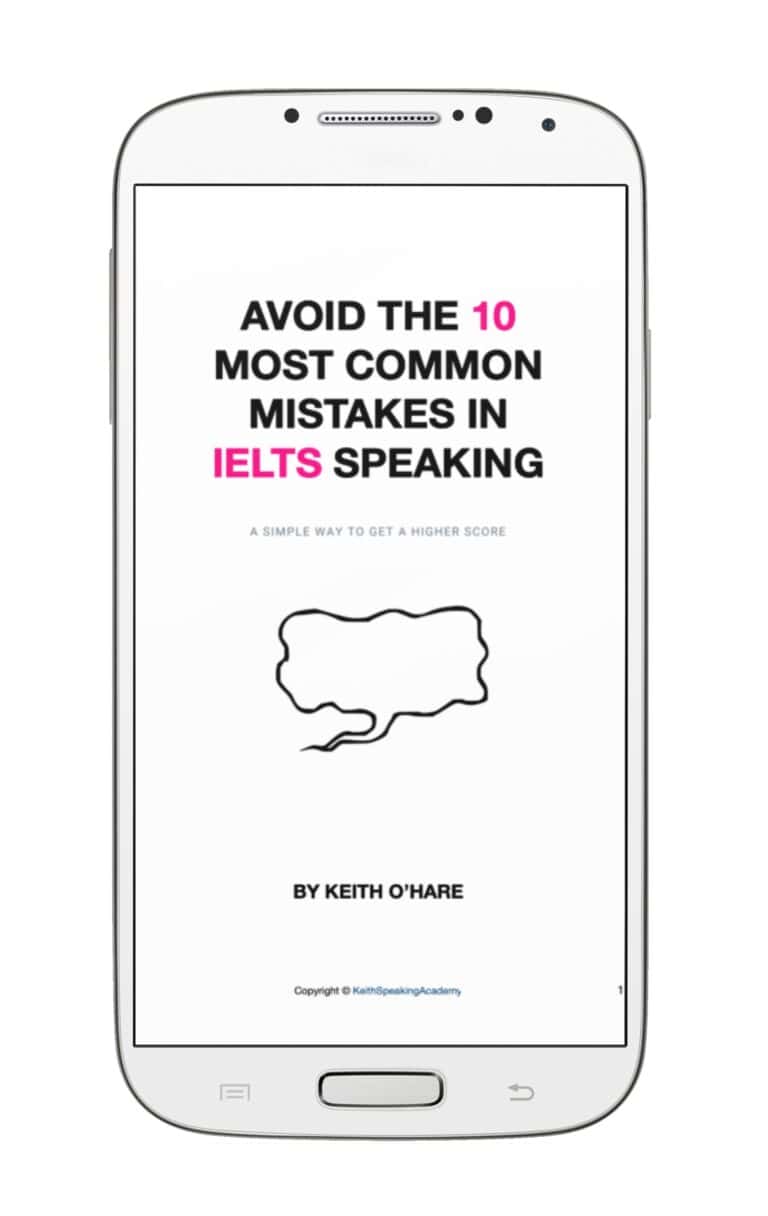Download this IELTS Speaking Lesson PDF
In IELTS Speaking Crime is an unusual topic.
However, it may appear in IELTS Speaking Part 3 so it is really important one to prepare because it involves a lot of unique and special vocabulary.
In this lesson, we will look at the vocabulary, idioms and language you need to talk confidently on this topic.
Keith O'Hare
What you will learn
IELTS Vocabulary Crime
Here is some essential vocabulary you can to start using to talk about this topic of crime.
crime (n.) countable and uncountable
To commit a crime
The crime rate = how much crime there is
There are many types of crime, here are some of the most common types with examples.
Violent crimes
- rape
- murder
- kidnapping
- car-jacking
- arson
- genocide
- mugging
Petty crimes
- shoplifting = stealing from a shop
- trespassing = going on private property
- pick-pocketing = stealing from someone’s bag or pocket
Property crimes
- vandalism = damaging public/private property
- burglary = stealing from a house
- robbery
- car theft
smuggling = (e.g. drugs – take illegally across a border)
Cyber crimes
- identity fraud = pretending to be someone else
- theft (especially credit card information)
- ransomware = software that blocks your computer until you pay money
White collar crimes
fraud
embezzlement = stealing money from a company you work for

Here is some more vocabulary about people who commit crimes and the punishment they can get
a criminal (n.) (person)
We can also say,
- a wrongdoer
- a lawbreaker
criminal (adj)
To commit a criminal act
To have a criminal record
Punishments
To go to jail / to prison
To serve a prison sentence (period of time)
He served a 10 year sentence
She will serve a life sentence (in prison).
To serve time
To do community service
A deterrent against crime =a discouragement
IELTS Speaking Part 3 Tips
The key to doing well in IELTS Speaking Part 3 is to develop your answers. Simple as that.
The more you develop, the more chances the examiner has to evaluate your real level.
However, don’t be surprised if the examiners interrupts you, that is normal.
A good way to develop your answer is to give reasons, opinions, explanations and examples.
Debates and Discussions about Crime
Should young criminals be sent to prison for committing crimes?
When talking about young criminals, we can also use these phrases to describe a young person who doesn’t follow the rules, obey the law
- A juvenile delinquent
- A young offender
- A minor (=young person)
These phrases may be helpful when discussing this topic.
They may commit a crime by accident
Prison won’t act as a deterrent
Community service will deter juvenile delinquents
Yes, because we need to ensure the safety of our citizens
They should be given an alternative sentence, such as community service
They need some punishment, so they realise that they have slipped up (=made a mistake), but maybe not prison, because that might turn then into a hardened criminal.
No, because they would suffer huge mental stress, and the chances are they will reoffend (=commit a crime again)
No, they will just learn how to be a better criminal in prison
To put someone on probation = to release from prison early (to try and lead a normal life)
Well it depends on the intention of the minor, because sometimes young ones are not really aware of what they are actually doing and they may have been led astray (=misled) by someone.

How technology can help tackle crime
The police can use technology to get digital fingerprints, and analyse them in a database, and so this helps them identify criminals
By using CCTV cameras we can deter (=discourage) people from committing crimes because they know they will be seen and probably caught
Police use face recognition, and motion and sensor technology to tackle certain crimes
Algorithms on social media can be used to tackle cyber bullying
Technology can help tackle crime by assisting the authorities to collect information about criminals effectively and efficiently to support their investigation of a crime
I read an article about that some police forces are using AI technologies to assess the potential threat of an arrested suspect to society and if they should be kept in custody (=kept in prison before their trial) or released on bail (released from prison before their trial happens by payment of a sum of money).
The crime rate nowadays is lower than in the past
This is a difficult issue to discuss, so here are some phrases to express this idea:
- It’s not black and white
- It’s not easy to say
- It’s hard to say
- It depends who you listen to
- I’m in two minds on this matter
Some crimes have been reduced but others, like cybercrime have popped up (=suddenly appeared) in recent years
It depends which crimes we are talking about. If we are talking about violent crimes, there doesn’t seem to have been much change, but many property crimes, like burglary have certainly decreased because home security is much better than before.
Crime rates have fallen in many cities due to increased CCTV coverage, and because there are more policemen patrolling the streets.
Well, if you listen to the politicians, then yes, the crime rate appears to be lower, but I am not sure we can always believe what we hear.
I’d say the crime rate has increased in many places due to widespread use of the Internet which makes it easier for criminals to reach their victims. For instance, child predators can stalk minors via the Internet, and also some people may commit identity fraud without leaving any trace.
Idioms to talk about Crime
The following expressions can be used to talk about crime
To turn to a career of crime = to start a life of crime
He fell in (=make friends in a negative way) with some bad boys, and turned to a career of crime
To be caught red handed = to be caught in the act
He was caught red handed stealing money from the cash till
To do time = spend time in prison
He’s doing time after he was caught for drunk diving
To go straight = obey the law
After 2 years behind bars, he has decided to go straight
To keep your nose clean = obey the law
After 2 years behind bars, he has decided to keep his nose clean
To blow the whistle on someone = to tell the police that someone is committing a crime
She blew the whistle on her boss who was committing fraud
Some useful Links
Different types of crime
https://open.lib.umn.edu/socialproblems/chapter/8-2-types-of-crime/
How technology can help tackle crime
https://www.bestvalueschools.com/lists/5-ways-technology-has-changed-our-ability-to-solve-crimes/
Crime rates today compared to the past
More live lessons for you
If you liked this lesson, leave a comment below!
There are more lessons you can follow in the links below too.
COUNTRYSIDE in IELTS Speaking. Learn vocabulary and collocations about the countryside.
NEWS in IELTS Speaking. Learn vocabulary of national, international and personal news, as well as tips on IELTS Speaking Part 2
SCIENCE in IELTS Speaking. Learn vocabulary and idioms to talk about different branches of science you like and get ideas to talk about.


Thanks a million for your amazing teaching methodology . I wish I could take writing courses too .but unfortunately in iran we dont have visa card to pay. Money transactions are difficult and almost impossible
Sorry to hear that, check out Fiona’s site that also has some good free writing resources: https://ieltsetc.com/ielts-writing/
Hello .
i wish i found you sooner . i just want to thank you because of teaching that good . and run that uniqe website . i wish you the best . thank you so much and i love you .
Thanks and great to hear from you.
Loving your way of teaching:) I am a big fan of yours, Keith.
Thanks Marjan!
I love the way you educate, using creativity and photographic memory benefits in your teaching and I bet your live lessons are the most remembering lessons I’ve ever had in my life. Thank you so much!! 🦋🙏🏼💚
Thank you so much for this!